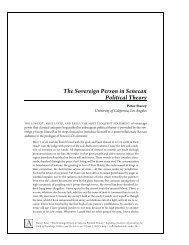Deceit, Desire, and the Literature Professor: Why Girardians Exist
Deceit, Desire, and the Literature Professor: Why Girardians Exist
Deceit, Desire, and the Literature Professor: Why Girardians Exist
Create successful ePaper yourself
Turn your PDF publications into a flip-book with our unique Google optimized e-Paper software.
LANDY | DECEIT, DESIRE, AND THE LITERATURE PROFESSOR: WHY GIRARDIANS EXIST 9<br />
say, is liking.) And <strong>the</strong> reason people keep coming back for more is not that <strong>the</strong>y keep seeing<br />
commercials; it is that <strong>the</strong>y enjoy <strong>the</strong> product. You could saturate <strong>the</strong> airwaves with glamorizing<br />
visions of Ann Coulter, but you’re never going to get me to prefer her over Zooey Deschanel.<br />
Perhaps nowhere is this phenomenon—<strong>the</strong> resistance to contagion—more apparent than<br />
in <strong>the</strong> high chair at dinnertime. “Nothing is more mimetic,” declares Girard, “than <strong>the</strong> desire of a<br />
child.” 30 One wonders, has he ever met a child? 31 Has he ever tried to feed one a brussels sprout?<br />
“Yum yum,” we say, absurdly hoping that our desire for healthy food will carry over mimetically.<br />
“Blech,” says <strong>the</strong> child, unceremoniously spitting it out. You can’t get a child to want to eat brussels<br />
sprouts, because this kind of desire depends on liking, <strong>and</strong> children just don’t like brussels<br />
sprouts. They do not get all <strong>the</strong>ir desires from parents (even in such a wonderfully closed environment,<br />
with so little outside stimulus). They can see <strong>the</strong>ir parents eagerly eating healthy food<br />
till <strong>the</strong> cows come home, but <strong>the</strong>y will st<strong>and</strong> right by <strong>the</strong>ir decision to yell for marshmallows.<br />
(Not to mention <strong>the</strong>ir decision to yell for more. Where did little Suzie get <strong>the</strong> desire to hear <strong>the</strong><br />
same story ninety-six times in a row? Surely not from <strong>the</strong> grownup she’s tormenting with it.)<br />
So Lanier couldn’t get me to want to watch Kill Bill 2. Cindy Crawford couldn’t get me to<br />
want to drink Pepsi. Fox News can’t get me to find Ann Coulter appealing. Parents can’t get <strong>the</strong>ir<br />
children to crave brussels sprouts. And nei<strong>the</strong>r, finally, can parents get <strong>the</strong>ir children to want a<br />
goodnight kiss from <strong>the</strong>m. In one of <strong>the</strong> most extraordinary passages of <strong>Deceit</strong>, <strong>Desire</strong>, <strong>and</strong> <strong>the</strong><br />
Novel, Girard actually tries to convince us that this scenario is what is going on in Swann’s Way:<br />
when <strong>the</strong> young protagonist begs his mo<strong>the</strong>r to come <strong>and</strong> kiss him goodnight, says Girard, it is<br />
only because she has somehow “instigated” this desire. 32 I suppose Girard has to say this, because<br />
o<strong>the</strong>rwise it might seem as though children have desires of <strong>the</strong>ir own, outside of mediation.<br />
But it’s just not true about Proust’s novel, <strong>and</strong> it’s also not true about reality. If it were, I<br />
think it would bring about a revolution in parenting.<br />
Let’s sum up: it is perfectly possible to form desires in <strong>the</strong> absence of a model (<strong>the</strong> pica<br />
sufferer’s yearning for dirt); it is perfectly possible, conversely, for o<strong>the</strong>rs’ desires to leave us cold<br />
(<strong>the</strong> child’s stubborn disinclination toward brussels sprouts); <strong>the</strong> fact that we sometimes act on<br />
recommendations from admired friends (or from experts) proves nothing, since we are entirely<br />
capable of declining recommendations (Kill Bill 2, no thank you); 33 <strong>and</strong> <strong>the</strong> fact that <strong>the</strong>re are<br />
always multiple potential models (bro<strong>the</strong>r Aron, bro<strong>the</strong>r David) strongly suggests that those potential<br />
models are not doing <strong>the</strong> choosing for us. In short, <strong>the</strong>re is no basis at all to <strong>the</strong> central<br />
premise of Girardianism: that “human beings have no desires of <strong>the</strong>ir own,” that <strong>the</strong>re is never a<br />
reason (objective or subjective) for wanting something ra<strong>the</strong>r than something else, that spontaneous<br />
impulses are an illusion, that autonomy is impossible.<br />
In fact, I sometimes wonder whe<strong>the</strong>r anybody thinks this way. Do <strong>Girardians</strong> <strong>the</strong>mselves believe<br />
it? They may think <strong>the</strong>y do—but if <strong>the</strong>y really did, <strong>the</strong>y’d act a little differently from <strong>the</strong> rest<br />
30 “VDS,” 25.<br />
31 Girard, of course, has met children, <strong>and</strong> inevitably takes his experience with <strong>the</strong>m as confirmation of his existing<br />
beliefs. When an interviewer asked him whe<strong>the</strong>r he had any plans to give an empirical grounding to his <strong>the</strong>ory, Girard<br />
responded as follows: “I have observed a lot of mimetic rivalry lately with my gr<strong>and</strong>-children” (“AC,” 277). This is like<br />
saying that all socks everywhere are black, <strong>the</strong> evidence being that I just pulled a few black socks out of my drawer.<br />
32 “When <strong>the</strong> mo<strong>the</strong>r refuses her son a kiss she is already playing <strong>the</strong> double role characteristic of internal mediation:<br />
she is both <strong>the</strong> instigator of desire <strong>and</strong> a relentless guardian forbidding its fulfillment” (DDN, 35). Hence, ostensibly,<br />
“desire is triangular in <strong>the</strong> child just as it is in <strong>the</strong> snob” (DDN, 35).<br />
33 All around me my beloved <strong>and</strong> admired friends are yearning to eat cilantro, watch Tarantino films, <strong>and</strong> make babies.<br />
I continue to feel love <strong>and</strong> admiration for my friends, but for cilantro, Tarantino, <strong>and</strong> babies—sorry, nothing.



